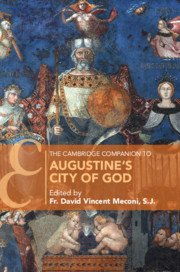Book contents
- The Cambridge Companion to Augustine’s City of God
- Cambridge Companions to Religion
- The Cambridge Companion to Augustine’s City of God
- Copyright page
- Dedication
- Contents
- Notes on Contributors
- Preface
- Abbreviations: Works by Augustine
- 1 Introduction
- 2 Book 1
- 3 Book 2
- 4 Book 3
- 5 Books 4 & 5
- 6 Books 6 & 7
- 7 Books 8–10
- 8 Books 11 & 12
- 9 Books 13 & 14
- 10 Books 15 & 16
- 11 Books 17 & 18
- 12 Book 19
- 13 Book 20
- 14 Books 21 & 22
- 15 Epilogue
- References
- Index
- References
12 - Book 19
The Ends of the Two Cities: Augustine’s Appeal for Peace
Published online by Cambridge University Press: 21 August 2021
- The Cambridge Companion to Augustine’s City of God
- Cambridge Companions to Religion
- The Cambridge Companion to Augustine’s City of God
- Copyright page
- Dedication
- Contents
- Notes on Contributors
- Preface
- Abbreviations: Works by Augustine
- 1 Introduction
- 2 Book 1
- 3 Book 2
- 4 Book 3
- 5 Books 4 & 5
- 6 Books 6 & 7
- 7 Books 8–10
- 8 Books 11 & 12
- 9 Books 13 & 14
- 10 Books 15 & 16
- 11 Books 17 & 18
- 12 Book 19
- 13 Book 20
- 14 Books 21 & 22
- 15 Epilogue
- References
- Index
- References
Summary
In Book 19, Augustine concentrates on leading two audiences, both beset by different forms of violence, unrest, and insecurity within and without, to accept God’s offer of the peace that endures in heaven’s everlasting life as the supreme good. Primarily, this appeal for peace has a protreptic quality to attract a non-Christian audience. Especially for their sake Augustine uses, in addition to the divine authority of Scripture, the reason of philosophical argument in Book 19. Secondarily, the appeal has a didactic exhortation for a Christian audience to seek more ardently the peace of the heavenly Jerusalem. Even the pilgrim Church has “sheer misery compared to the happiness we call ultimate” (ciu. Dei 19.10; Babcock, 2.364; CCSL 48.674). Augustine makes his appeal for peace by humbling the peace of what each of the two audiences experiences. All people experience in this life on earth, in different ways, not only a broken society, but also a broken heart. But without recognizing that experience in humility, why would readers yearn for heaven’s peace? To all, Augustine makes an appeal for what he calls pax plenissima atque certissima (ciu. Dei 19.10; CCSL 48.674).
- Type
- Chapter
- Information
- The Cambridge Companion to Augustine's City of God , pp. 228 - 250Publisher: Cambridge University PressPrint publication year: 2021
References
Further Reading
- 1
- Cited by

